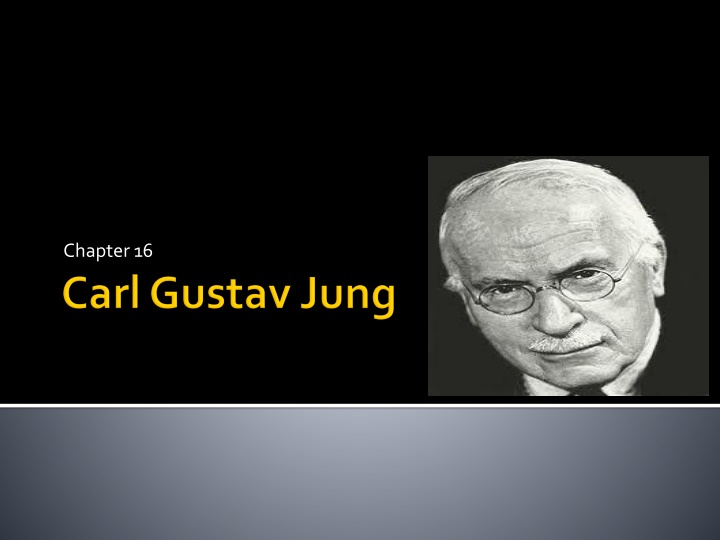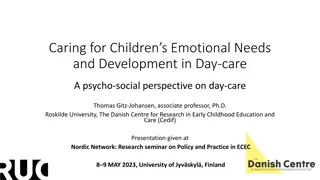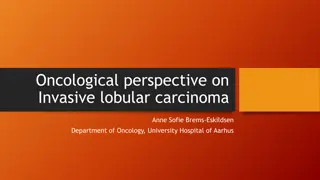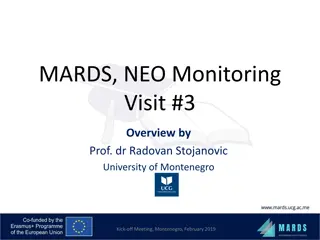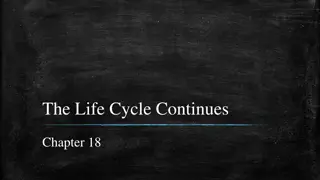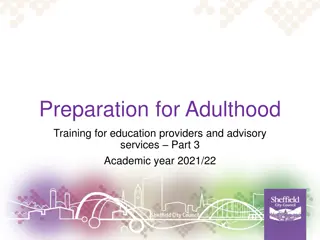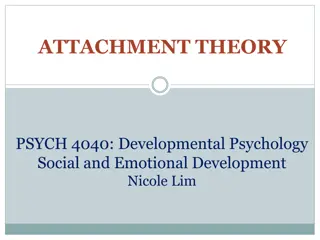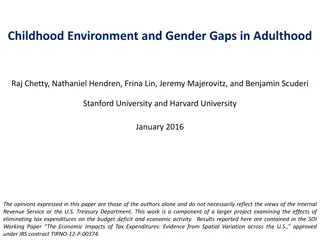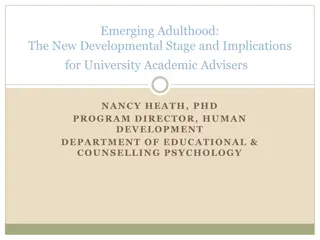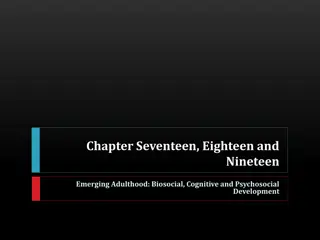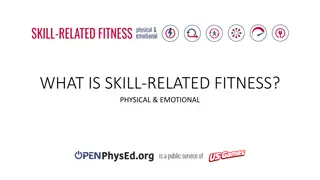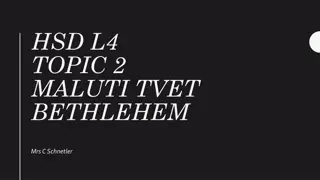Neo-Freudian Theory: Social-Emotional Focus in Adulthood
In this chapter, the Neo-Freudian theory is explored with a contemporary perspective, focusing on the social-emotional aspects in midlife adulthood. Key stages of life, such as birth to 40 years and beyond, are discussed in relation to external and internal development. Concepts like ego, persona, shadow, anima-animus, and the self are delved into, emphasizing the importance of recognizing and integrating polarities for achieving wholeness. The personal unconscious and collective unconscious are also examined, along with the archetypes they manifest. Resources for further exploration, like a Jung archetype quiz and a video on anima-animus, are provided.
Download Presentation

Please find below an Image/Link to download the presentation.
The content on the website is provided AS IS for your information and personal use only. It may not be sold, licensed, or shared on other websites without obtaining consent from the author.If you encounter any issues during the download, it is possible that the publisher has removed the file from their server.
You are allowed to download the files provided on this website for personal or commercial use, subject to the condition that they are used lawfully. All files are the property of their respective owners.
The content on the website is provided AS IS for your information and personal use only. It may not be sold, licensed, or shared on other websites without obtaining consent from the author.
E N D
Presentation Transcript
Neo-Freudian theory (contemporary of ??????) Social-emotional focus (similar to Erikson v. the psychosexual focus of Freud) Key stage of life = adulthood (midlife) v. Erikson s focus on adolescence Idea of determinism present in Jung s theory Personality theory speaks to the I (so reinforces Western, individualistic notions)
1. Birth 40 years (external development; our mask ) 2. 40 + (internal development; focus on our shadow ) Don t hold on to past accomplishments Q. Midlife Crisis?? (NO)
Ego: conscious awareness of self and world Persona: ego s mask ( our image The Shadow: things we keep hidden (often negative, or perceived negatively by society) - -part of our polarities like our Anima-Animus: feminine and masculine attributes Self: who we are. The self gives us our inner urge to balance our various parts and to bring wholeness to our self and meaning to our life. *psyche: sum total of our conscious and unconscious personality
Personal unconscious: unique to the individual -- feelings we have repressed in our lives (the shadow resides here, as may our anima or animus) Collective unconscious: innate energy we share with all other humans Exists at deepest level of psyche The collective unconscious gives us our archetypes (Examples of archetypes: the wise old woman or man; earth mother; trickster-- we symbolize these in various ways as characters in literature and movies, images in art, symbols in oral traditions (within a given culture and across cultures)
https://www.psychologistworld.com/tests/jun g-archetype-quiz.php
Anima-Animus explored (*You can stop watching at 2:35) http://www.youtube.com/watch?v=ZN47s0mPfR U
SHADOW(hidden elements) ----------PERSONA (conscious mask) anima----------------animus introvert------------extravert Must recognize and blend these polarities to achieve wholeness, or individuation (Jung)
By exploring facets of ourselves that weve repressed in our unconscious Q. How do we accomplish this???? A. By analyzing our dreams-- Gateway to unconscious is DREAMS Archetypes are often represented in our dreams --must figure out their significance in our lives
http://mentalfloss.com/article/55442/12- common-dreams-and-what-they- supposedly-mean
1. Psychosis: loss of contact with reality, usually including false beliefs about what is taking place or who one is (delusions) comes from lack of individuation 2. Mandala: symbolic figures of life and wholeness; place in the universe https://www.youtube.com/watch?v=IYVcjFhpsHc 3. Psychic powers (ESP)
1. Western culture emphasizes power & materialism neglects spirituality *** result = psychosis 2. Society often encourages us to perform certain social roles based on gender, age, etc. -- the result may be to project negative and/or shadow sides onto others, and to not find inner wholeness 3. Individuation can be lost in the socialization process (what other theorist does this sound like?) Q. Formula for personal change? A. Work to achieve individuation by tapping into our unconscious and by blending elements of our personality
1. Personality tests: Myers Briggs Test yours.. https://www.123test.com/jung-personality-test/ http://www.humanmetrics.com/cgi-win/jtypes2.asp 2. Branding: http://www.proprofs.com/quiz-school/story.php?title=know-your-brand-types_1 3. Self-help books
Who looks outside, dreams; who looks inside awakes. C. G. Jung
